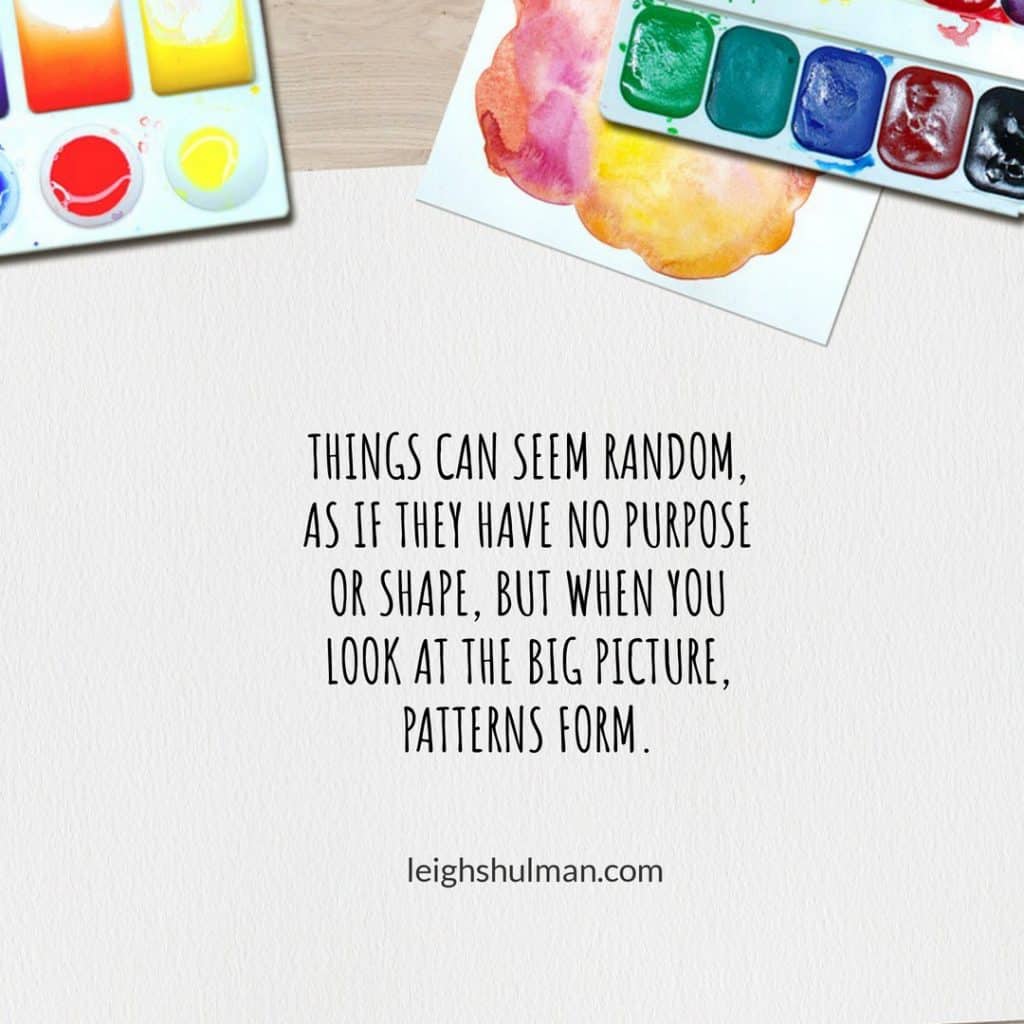The hardest part of the creative process is knowing where to begin. Because when you’re just getting started at something, you have too many options. Too many options with no shape, no direction, nothing solid. You can go anywhere, do anything you want, create or be anything you please.
Pure freedom with no limits is daunting. It’s a creative free fall. The most natural thing of all to do in this situation is flail your arms and scream.
It’s no wonder so many of us run away from the blank page to do anything that saves us from the chaos of having absolutely no idea what we’re doing.
If you run, though, where will you go? Because if you plan to create something, you will always find yourself face to face with the chaotic edge. It is an uncomfortable and yet necessary part of the creative process.
Creativity and chaos go hand in hand, but you don’t have to fall prey to fear. Try these seven ideas — one for each day of the week — to dance with the chaos instead.
1. Don’t wait for the right conditions to start.
If you try to find the right place to begin, the right time, the right place, the right inspiration, you’ll never start.
Because there is no right place to begin your creative process. You just have to jump right in.
Creativity begins in a mess. There are endless ideas, thoughts and images swirling around in a miasma of color and sound.
“And by the way, everything in life is writable about if you have the outgoing guts to do it, and the imagination to improvise. The worst enemy to creativity is self-doubt.”
― Sylvia Plath
2. Pick a place, any place and just begin.
Back in 1993 when I saw Will Smith play Paul in Six Degrees of Separation, I was amazed by his acting skill. I didn’t expect it from the Fresh Prince of Bel Air. Maybe he didn’t either, but he jumped from music into a sitcom from a sitcom into a John Guare play.
Together, they make one multi-faceted successful career. But he had to start somewhere.

3. Recognize resistance when it’s happening.
Steven Pressfield, author of The War of Art, describes the resistance you’ll feel when you first sit down to write. It’s the voice that tells you not to bother. He felt it all the way leading up to his first famous novel, The Legend of Bagger Vance. If you read The War of Art, you’ll find out he still feels it every time he sits down to write.
Every morning when you sit down to work can feel like jumping off a cliff. The more you push through the resistance, the easier it gets.
4. You will always be just a little bit uncomfortable with the creative process.
In the beginning, you don’t know where you’ll end up. It’s uncomfortable, but part of your work is to learn to live with discomfort. It will always be there. That feeling happens when you’re doing something you’ve never done before. It tells you that if you keep going, you will break through to a new level.
If you stop before you reach the next level of your creative process, you’ll still feel uncomfortable, but you won’t have the benefit of the breakthrough.
5. Make a plan, but also allow creativity to take you where it leads.
Thirty years ago, no one could have possibly predicted the path that brought Will Smith and Steven Pressfield together, and yet, looking back, it couldn’t have happened any other way. It’s almost as if it was planned.
But it wasn’t planned. Not in the way you think, at least. It was planned in the sense that both kept going. Both fought the resistance they had against throwing themselves day after day into a career that might not work, that might be hated, that might be rejected, that might just be awful or not recognized.
You want control of the situation, but you will never have control. Instead, follow the process. Try something. If it doesn’t work, try something else.
“In the measurement world, you set a goal and strive for it. In the universe of possibility, you set the context and let life unfold.”
― Benjamin Zander, The Art of Possibility: Transforming Professional and Personal Life
6. Your creative process will lead to failure more often than success.
The problem is you want answers. You want to know you’ll create something beautiful. You want to know you’ll be appreciated.
Do you have any idea how many times your favorite author tried and failed before they wrote that book you love? No, you don’t. That’s because we so rarely talk about our failures. We act as if failure means there’s something wrong with us.
Failure and mess are crucial to the creative process. It means you’re experimenting and trying new things. Some work. Most don’t. It’s part of the process.
“You don’t start out writing good stuff. You start out writing crap and thinking it’s good stuff, and then gradually you get better at it. That’s why I say one of the most valuable traits is persistence.”
― Octavia E. Butler
7. Celebrate your wins, big or small.
It’s easy to focus on the negative when you’re not getting the results you want. It’s so easy, in fact, that you’ll likely overlook the wins. Get in the habit of noticing and celebrating all the good you do.
You wrote a paragraph you love. You felt inspired and finished a chapter. You sent a pitch to a magazine.
When you forget to see the positive and instead focus on what you don’t have or haven’t done, somehow the negative expands. When you create a practice of noticing the accomplishments, you’ll find that you’ve done much more than you realized.
All creation begins with chaos.
Creation of the entire universe began with chaos, Then little by little, things fell into place. You have land, water, sky, angels, animals, humans. Then the humans, who have been given everything, decide to invoke chaos once again when they break the rules of order.
Human beings come from chaos. We return to chaos. The universe, too, begins in chaos and vacillates between order and chaos repeatedly.
Our creative processes work by the same principle.
Sometimes, things seem random, as if they have no purpose, meaning or shape. When you take a look at the big picture, patterns form. The gorgeous outlines of fractal patterns give an example of this:

Up close, you don’t know what you’re seeing.
Zoom out, and you begin to get the idea that something more is going on.
Give it some time, and you see a whole beautiful picture.
Your work will do the same. You just have to trust yourself enough to give it the time to open and expand.
There are no guarantees when you write, but if you choose not to write, then you are guaranteed to never reach your goals.

